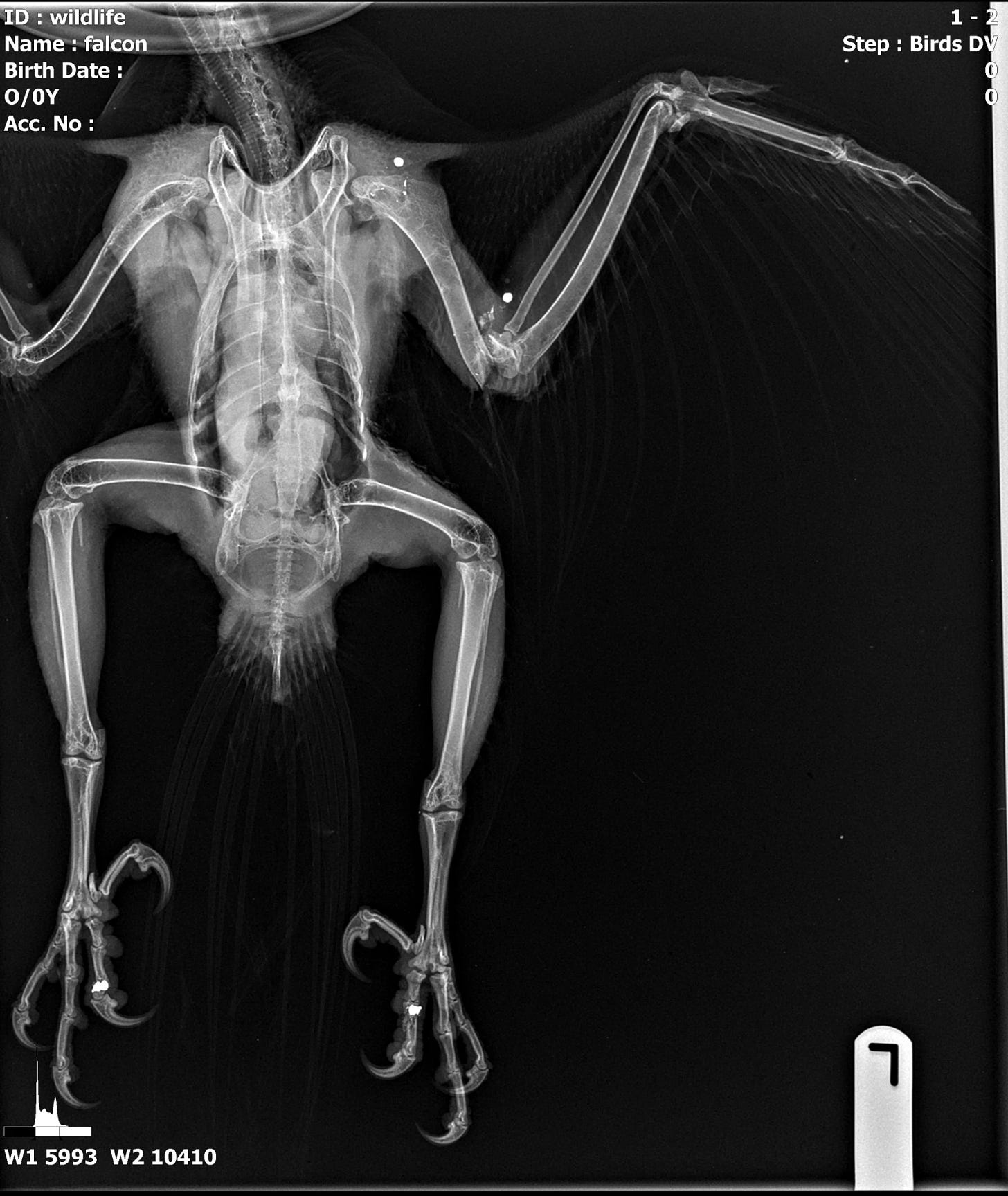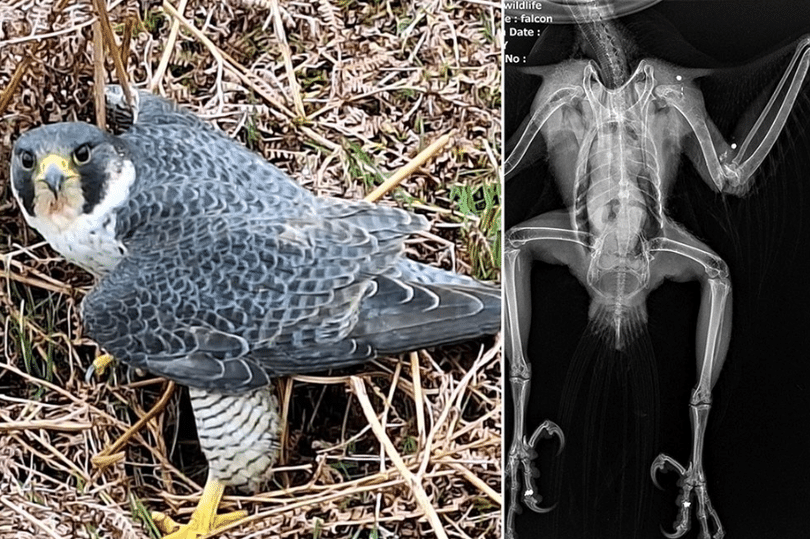Derbyshire Police are working with the Royal Society for the Protection of Birds (RSPB) after an adult female Peregrine Falcon was discovered shot in the Peak District at Hey Clough off the A628 Woodhead Pass, near Crowden, on Saturday, April 4.
Like all birds of prey, peregrines are fully protected by law (see our page ‘Birds of prey and the Law’) but are relentlessly targeted by gamekeepers. X-rays of this bird showed shotgun pellets lodged in the elbow and shoulder of the left wing. A post-mortem also revealed a puncture wound in the bird’s chest caused by the pellets. The post-mortem conclusion was that the bird was shot at or near the location she was found, as the injuries sustained would have prevented her from flying.
Derbyshire Police believe the shooting would therefore have taken place on or very near to the RSPB’s Dove Stone Nature Reserve.
Sergeant Chris Wilkinson, of Derbyshire police’s Rural Crime Team, said: “It is a sad fact that bird of prey crime is still prevalent in Derbyshire and particularly concerning is that this incident appears to have occurred on an RSPB reserve. Raptor persecution is a serious crime against nature and a wildlife crime national priority, and we are keen to speak with anyone who may have information about this crime.”

The Dark Peak – a black hole for birds of prey
The RSPB’s Dove Stone reserve is on land owned by United Utilities (which as we reported last year famously decided not to renew grouse shooting leases as they ended on the huge areas of upland it owns). The reserve is described as “a dramatic landscape that’s home to an array of wildlife. This is a place to spot Curlews, Golden Plover and Mountain Hare on open moorland and blanket bog, or Peregrine Falcons and Ravens soaring over old quarry cliffs.”
Unfortunately, it also sits within the Peak District National Park, an area blighted by grouse shooting and raptor persecution. The Park has a long history of raptor persecution, which was detailed as long ago as 2006 in a lengthy report called Peak Malpractice. The report’s focus was entirely on the Dark Peak (the north of the National Park) and it noted that adult goshawks were ‘gone’, with 12 established pairs ‘missing’, along with Peregrines and badgers – and all on or next to land managed for driven grouse shooting. In 2007 the report was updated with a publication called Peak Malpractice 2.
In 2018 the RSPB ceased its involvement in the ineffective Peak District Bird of Prey Initiative after stating that the multi-partnership project continually failed to improve the fortunes of raptors in the Dark Peak. Richard Barnard, the then RSPB’s Area Conservation Manager for Yorkshire and the Peak District, was quoted saying that “some group members are failing to acknowledge that the main reason birds of prey are doing so badly in the Dark Peak is because of illegal persecution such as shooting, trapping and poisoning”.
The RSPB’s current Head of Investigations Mark Thomas, who lives locally and is a passionate raptor fan, posted an article on the RSPB Community’s page that same year saying:
“Gamekeepers [were] sentenced for destroying active goshawk nests and baiting cage traps with pigeons. Persecution still continued unabated, shot peregrines, poisoned ravens, goshawk eggs smashed, nests shot out at night and an armed man filmed with a hen harrier decoy – all in the Dark Peak and now under the glare of the disapproving public at large.
With no breeding peregrines at all in the Dark Peak in 2017, this has now truly become a raptor black hole, ruled by the persecutors… all this in a park with millions of visitors per year.”
Nothing has changed since then.
In 2022, the highly respected Northern England Raptor Forum (NERF) wrote a blog titled “Another dark day in the Dark Peak” which began:
“On the 25th February we learnt that the RSPB Investigations Team were concerned about the fate of a satellite tagged Hen Harrier that had joined the ‘disappeared’ in the Peak District near to Stocksbridge. The matter has been reported to South Yorkshire Police for investigation…
Today we learn that in March 2021 a member of the Peak District Raptor Monitoring Group [PDRMG], a NERF partner, found a dead Buzzard in woodland close to the Flouch near Langsett…the Flouch is less than 5 miles from Stocksbridge where the latest Hen Harrier went missing…we now know that the bird was shot to death by someone using a shotgun.”
Commenting on this most recent wildlife crime, Mark Thomas is quoted saying:
“To think that this stunning bird was found shot at Dove Stone – a place which we help manage for the benefit and safety of species such as the Peregrine – is shocking.
“This is just the latest incident of raptor persecution in the Dark Peak, a notorious blackspot for birds of prey, where these species should naturally be thriving. If anyone has any information about this crime, please contact us or the police.”

Grouse shooting and raptor persecution
From a desperate low point in the mid-1960s, Peregrine populations have been recovering in many lowland areas across the UK. City-living urban Peregrines are doing especially well, and are actually more successful than counterparts trying to survive in the more remote areas many of us associate this spectacular raptor with. London alone now has around thirty breeding pairs. But Peregrines are still missing from some upland areas in England and that is almost entirely down to illegal killing on shooting estates.
The RSPB recorded 182 confirmed incidents of Peregrine persecution across the UK between 2003 and 2022. Between 2018 and 2022 alone, 30 Peregrines were killed or injured in England, including 19 which were shot. Nationally a significant proportion of raptor persecution incidents are conclusively linked to land managed for bird shooting. In 2022 at least 64% of confirmed incidents of raptor persecution in the UK were associated with land managed for the breeding and shooting of grouse and pheasants.
The bird shooting industry is lawless and will never take protecting birds of prey – which they simply see as competitors to be eradicated – seriously. Protect the Wild will continue to say that licencing grouse moors will make no difference to the disgraceful and outdated attitudes endemic within shooting, and we will continue to say that until the shooting industry is shut down for good the UK’s birds of prey will always be at risk from the criminals within its midst.

